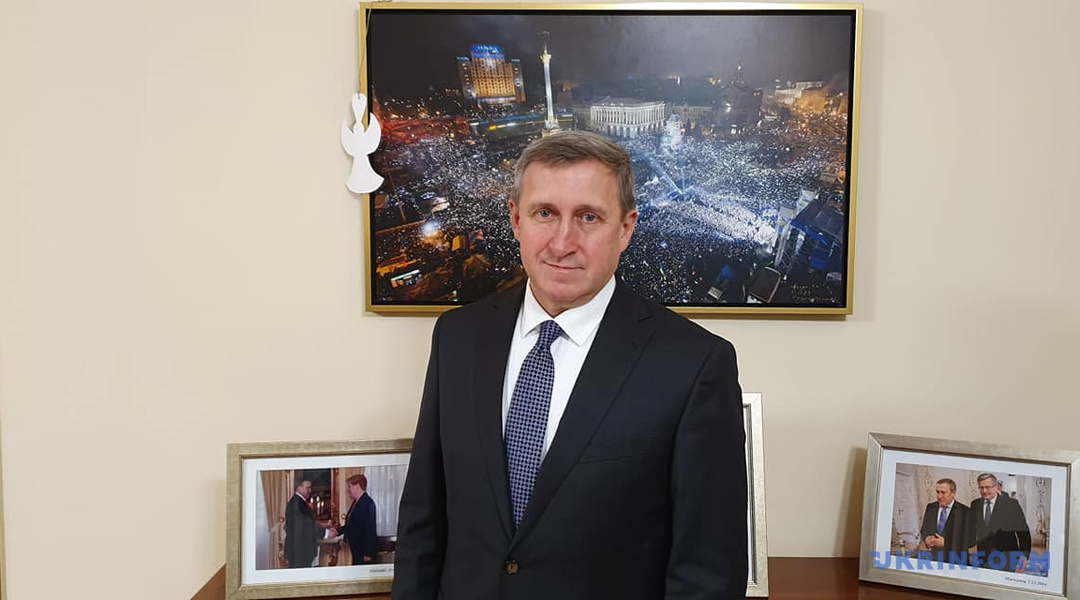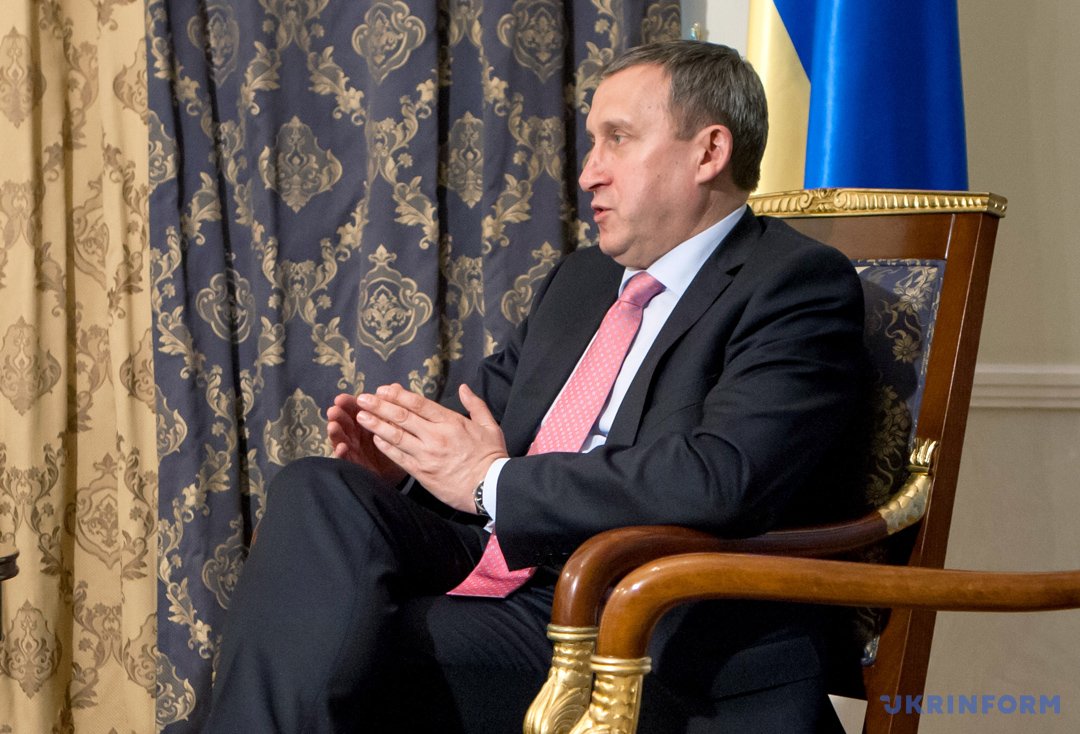Last year was quite intense in Ukrainian-Polish relations. Poland has traditionally been very active in supporting Ukraine on the international stage. However, there are some problems and unresolved issues between the two countries, and Kyiv and Warsaw have to focus on them in 2020.
Ukraine's Ambassador to Poland Andrii Deshchytsia spoke in an interview with an Ukrinform correspondent about how relations between the two countries look today and how they are going to develop in the near future.
Q: Mr. Ambassador, Ukrainian Foreign Minister Vadym Prystaiko has recently held a meeting with Ukrainian ambassadors in Western Europe in Berlin. In particular, he said that next year the focus would be on making Ukraine's foreign policy pragmatic and economical. What can you say about the Polish direction?
A: First and foremost, we constantly raise the question that our relations on issues important to Ukraine should be treated pragmatically by both states. This pragmatics has dominated our relationship in the last few months. I hope that this trend will continue in the future.
With regard to the development of trade and economic relations, trade between Ukraine and Poland is steadily growing. It amounted to about $7 billion in 2018, or over 10% more than in 2018.
However, we lack the growth in Polish investment in Ukraine. There is room for action in the short term. To some extent, this is directly related to growing dynamics of government-level contacts. We hope that Polish investments in Ukraine will increase in 2020, and the Polish prime minister's visit to Ukraine will contribute to the interest of the Polish business in Ukraine.
Q: By the way, Polish Prime Minister Mateusz Morawiecki has been in his post for the third year, but he has never been to Ukraine. The Ukrainian-Polish intergovernmental commission on economic cooperation has not met for a long time. Can we expect such a meeting?
A: There is a permanent telephone link between the two premiers. The lack of visits is to a certain extent caused by objective factors. These include elections in Ukraine and Poland last year and the formation of governments of both countries. We hope that a meeting of the intergovernmental commission, which usually precedes a meeting of the prime ministers, will take place as soon as possible. It is worth noting that this commission is very large and consists of about ten subcommittees.
In the case of Ukraine, we have already accomplished our homework. After the formation of the government, the commission's co-chairman has been appointed - Deputy Prime Minister Dmytro Kuleba. We expect the Polish side to appoint or reappoint its co-chairman of the commission. Until now, it was Minister Jadwiga Emilewicz, who now serves as minister of development in the new government led by Mateusz Morawiecki.
We will propose not to wait for all subcommittees to meet, but to hold a meeting in Warsaw or Kyiv so as to work out the current agenda for bilateral trade, economic and investment cooperation. Then, depending on which areas need to be addressed, it will be possible to hold the meetings of these subcommittees.

Q: That is, the visit of the Polish prime minister to Ukraine or the Ukrainian PM to Poland should be preceded by a meeting of this commission?
A: Such practice has been in place until now. However, I do not think that we need to get too attached to it. Now there is a need for a visit by the Polish prime minister, and we will insist that the visit not be tied to the meetings of these subcommittees or commissions. We are interested in having direct working contacts between the premiers.
Q: Which visit should you expect first and foremost: Morawiecki's visit to Kyiv or Ukrainian Prime Minister Oleksiy Honcharuk's visit to Warsaw?
A: There is a practice of order of visits. The last one was a working visit by former Ukrainian Prime Minister Volodymyr Groysman to Poland for the economic forum in Krynica-Zdroj [in 2016]. Thereafter, there were no visits by Polish prime ministers to Ukraine. This situation needs to be remedied.
Q: Poland has overtaken Russia in terms of trade with Ukraine. But despite growing exports, the Polish government is asking the European Commission to impose quotas on certain types of agricultural products from Ukraine, such as corn. In fact, how much are Ukraine and Poland partners, and how much are they competitors in Europe?
A: This is a very good question because until some time we did not create competition with Polish manufacturers. Now, having modernized its economy and having changed the vector of its exports, Ukraine is becoming an objective competitor of Poland. In a market environment, this is normal. In such a situation, it is obvious that Polish manufacturers, haulers or farmers are trying to get some restrictions in order to protect their market.
But if both countries are WTO members, participants of the free trade area with the EU, then, in that case, we have to act in accordance with the rules that apply there, rules based on competition and the free market: they buy goods from those who are better.
Obviously, we should expect competition between Polish and Ukrainian producers. However, competition is to the benefit of consumers, so it should not be feared.
Now, for example, we see problems related to cargo transportation. We need more Polish auto licenses for Ukrainian haulers transporting products from Ukraine to EU countries.
Q: To a certain extent, it is also the link of the aforementioned chain.
A: It is to a certain extent, since the Polish side has some restrictions on the part of the EU, Europe is implementing its rules. And here there are Ukrainian haulers who are ready to execute orders on terms that are already unprofitable for the Polish side. This is a competition.
And again, we return to the question of changing the vector of Ukrainian exports, which have shifted to the West. The point is not only that we transport goods to Poland, but also that we transit them via Poland further to the West. Therefore, we need to be prepared for negotiations on expanding the presence of Ukrainian manufacturers, Ukrainian haulers, Ukrainian exports to Europe as far as the FTA with the EU allows us.

Q: The end of December showed that in such force majeure situations like holidays, when the number of travelers sharply increases, people stay in line at the border for 15-20 hours. What can be done now to relieve this tension at the border and to improve the border crossing situation?
A: First of all, it is necessary to talk about the optimization of the work of checkpoints and different forms of acceleration of border and customs control of persons. This can be the automation of the passage system, various electronic queues, electronic customs declarations, which can be sent to the border in advance, even before the arrival of goods at the border. I hope that the new Ukrainian customs will find a solution to these problems.
Q: This is a complex problem on both sides.
A: Yes, service culture is also very important. Very often, we record the discontent of people crossing the border. The attitude of border guards and customs officers to travelers is sometimes boorish. And people are very annoyed when they spend 15-20 hours at the border, and this leads to tension.
For several years, we have been talking about the spread of common border and customs control practices at all checkpoints. This practice has long been in place at four out of eight checkpoints on the Ukrainian-Polish border. Today, this requires the consent of not only the Polish side but also the European institutions. The introduction of such a form of customs, where Ukrainian customs operate near Polish customs (as it is currently done at four checkpoints), is showing its effectiveness.
We also have the potential to modernize checkpoints. For example, we are talking about the Korczowa-Krakovets checkpoint (Lviv region), which we have been talking about for a long time. It can be expanded by at least several times, bringing our infrastructure into line with that existing on the Polish side.
Q: Can we expect any qualitative breakthrough in common border issues in 2020?
A: I hope so. A breakthrough could be in improving the existing infrastructure, in particular, at the Krakovets-Korczowa checkpoint and the delimitation of passenger and freight traffic. The Polish side already has the relevant infrastructure, and it has partially been built on the Ukrainian side.
We are also discussing the creation of the Nyzhankovychi-Malhowice checkpoint (Lviv region). Currently, work is underway to approve the design estimates, with funds envisaged in the 2020 budget for this purpose. In addition, a pedestrian crossing is to be created at this checkpoint.

Q: Is there a thaw in bilateral relations after President Volodymyr Zelensky's meeting with his Polish counterpart Andrzej Duda in Warsaw in late August and the unblocking of search and exhumation works on Polish victims in Ukraine?
A: Yes, it is an element of constant dialogue between the parties that has changed qualitatively. Although historical issues remain on the agenda of bilateral relations, they have been removed from the top agenda of bilateral relations. This was influenced by the decision to lift the ban on search and exhumation works in Ukraine, which was implemented after President Zelensky's visit to Poland. This unlocked dialogue in many other areas and relieved tensions that existed during formal negotiations. Prior to this, complex historical issues have always been one of the first ones discussed at official meetings. Now the situation has changed.
Q: Is Polish President Andrzej Duda planning to visit Ukraine in the near future?
A: It will all depend on what schedule the president of Poland will have at the beginning of 2020. A presidential election campaign is about to begin in Poland and it is clear that the incumbent president, as one of the candidates, will focus on it. Such a meeting might take place. The presidents have recently had a telephone conversation - a very long, intense discussion of many issues that are on the agenda of bilateral relations and international politics. Clearly, there is interest in continuing this dialogue.
Q: What are your main priorities for 2020?
A: This is the opening of a branch of the Ukrainian Institute in Warsaw, which would create the conditions for a greater Ukrainian presence through the promotion of Ukrainian culture and business. It is also a way of making sure that there are unobstructed contacts between Ukraine and Poland so that the border unites, rather than divides us and our peoples.
Yuriy Banakhevych, Warsaw
